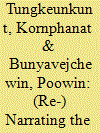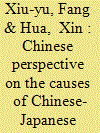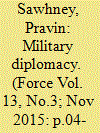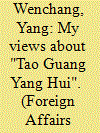| Srl | Item |
| 1 |
ID:
188849


|
|
|
|
|
| Summary/Abstract |
The launch of the Lancang-Mekong Cooperation (LMC) opened a fresh chapter in international politics in the Mekong region, by marking China’s official entry into the continental Southeast Asian arena. However, little is known about the LMC’s evolution. By extensively relying on the recently opened Archives in Bangkok, this article illuminates facts and narrates the LMC’s formation, with special emphasis on the Chinese perspective. It argues that, similar to Chinese-led regional multilaterals elsewhere, the LMC is a spoke of the continent-wide Belt and Road Initiative (BRI), and functions as a mini-BRI architecture in the Mekong region.
|
|
|
|
|
|
|
|
|
|
|
|
|
|
|
|
| 2 |
ID:
104227


|
|
|
|
|
| Publication |
2011.
|
| Summary/Abstract |
The state of the world in 2010 can be summed up in a single word: symbiosis. Chaos and change feed on each other in a phenomenon that mirrors the tendency towards change in today's international strategic landscape. This article attempts to create an overview of the most important features and trends of the situation by looking at shifts in major power relations, the rise of the Asia-Pacific region, geo-strategic upheavals, tension on the Korean peninsula, military security, world economy and China's diplomacy. It asserts that chaos is not necessarily a bad thing.
|
|
|
|
|
|
|
|
|
|
|
|
|
|
|
|
| 3 |
ID:
143685


|
|
|
|
|
| Summary/Abstract |
Chinese-Japanese relations have become increasingly tense in recent years. It might
be concluded superficially that the recent tensions originated from the historical
issues and the bilateral sovereignty disputes over some islands. However, these
tensions are deeply rooted in the structural contradictions of these bilateral relations,
such as the conflicting national strategies of China and Japan, the relative balance
of power between them, and the discrepancy of their interests in their games
against the background of macro transition of the overall strategic pattern of the
Asia-Pacific region. Furthermore, the U.S. strategic dilemma in this gaming process
adds destabilizing factors to the development of China-Japan bilateral relations.
The outcomes of the China-Japan tensions not only affect the rise and fall of the
relative strengths of these two countries, but also have major influences over the
general strategic arrangements of East Asia and the whole Asia-Pacific. Therefore,
it is very meaningful to probe the deep-rooted causes of the Chinese-Japanese
conflicts and to observe current China-Japan relations from the strategic perspective
because some solutions might be discoverd in this way.
|
|
|
|
|
|
|
|
|
|
|
|
|
|
|
|
| 4 |
ID:
141575


|
|
|
|
|
| Summary/Abstract |
The 6th Xiangshan Forum held here from October 16 to 18 amidst heightened tensions between China and the United States over the disputed South China Sea was a 1.5 track (officials and experts) military diplomacy. What set it apart was its grand scope and scale and that it was organised by the Peoples’ Liberation Army itself.
|
|
|
|
|
|
|
|
|
|
|
|
|
|
|
|
| 5 |
ID:
111554


|
|
|
|
|
| Publication |
2012.
|
| Summary/Abstract |
"Tao Guang Yang Hui" is an important guiding principle proposed by Deng Xiaoping for China's diplomacy in the present-day world. It has a very deep root in our traditional culture and constitutes a strategic principle we must persistently follow throughout the primary stage of socialism. For some 20 years, there have been incomplete and misguided interpretations of "Tao Guang Yang Hui" both at home and abroad. To keep following the low-key approach in our diplomatic work in the 21st century is entirely correct. "Tao Guang Yang Hui" is not outdated and will never be.
|
|
|
|
|
|
|
|
|
|
|
|
|
|
|
|
| 6 |
ID:
163409


|
|
|
|
|
| Summary/Abstract |
Chinese foreign policy and the conduct of China’s diplomacy have undergone tremendous transformation under Xi Jinping’s leadership since 2012. How can scholars explain the foreign policy transformation under Xi Jinping? As Chinese power rises fast, do the new power status and the changing balance of power lead to the foreign policy change, or does the more confident leadership play the ‘game changer’ role? The author argues that international structural changes alone cannot explain the foreign policy shift, and Xi Jinping’s leadership has played a key role in transforming Chinese foreign policy since 2012, elevating it to a new height of ‘major country diplomacy with Chinese characteristics,’ a brand name for the transformed Chinese foreign policy. Xi’s leadership role not only affects the redefinition of the vision and mission of Chinese diplomacy, but also leads to institutional restructuring of Chinese foreign and security policy apparatus.
|
|
|
|
|
|
|
|
|
|
|
|
|
|
|
|
| 7 |
ID:
163410


|
|
|
|
|
| Summary/Abstract |
China’s diplomacy has undergone a sea of changes under Xi Jinping’s rein. But there is no consensus on the nature, scope, essence and direction of these changes. This article aims to explore both the changes and continuities in Chinese foreign affairs under the Xi Jinping leadership through the lens of his recently much-advocated formulation of ‘major country diplomacy with distinctive Chinese features’. Tracing the evolution, manifestation and causes of Xi’s ‘major country diplomacy’, it is argued that Xi’s diplomacy is a clear departure from Deng Xiaoping’s TGYH ([Tao Guang Yang Hui] low profile) strategy and therefore transformative in nature. On the other hand, however, his strong adherence to the core realist assumptions about national security issues makes his idealistic and liberal global vision and his efforts to transcend ‘the traditional Western theories of international relations’ more difficult to accomplish. In this respect, the glass is still half full and half empty.
|
|
|
|
|
|
|
|
|
|
|
|
|
|
|
|